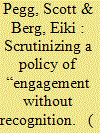| Srl | Item |
| 1 |
ID:
160772


|
|
|
|
|
| Summary/Abstract |
De facto states are conventionally perceived as illegal entities, usually ignored by the rest of the world and therefore also isolated and severely sanctioned in most cases. We investigate US foreign-policy engagement with Abkhazia, Nagorno-Karabakh, Northern Cyprus, Somaliland, and Transnistria and explore when, why, and how interactions between the United States and “places that do not exist” has taken place. This is done by extensively using WikiLeaks diplomatic cables from 2003– to 2010 as a primary information source. We assume that by engaging and not recognizing, the US has sought to increase its leverage and footprint in conflicts that somehow affect its national interests. This engagement approach is presumably most successful when targeted adversaries turn out to be agents of peace and stability, or when strategic calculus outweighs the rationale for the conventional treatment of sovereign anomalies.
|
|
|
|
|
|
|
|
|
|
|
|
|
|
|
|
| 2 |
ID:
138345


|
|
|
|
|
| Summary/Abstract |
As China has grown stronger, some observers have identified an assertive turn in Chinese foreign policy. Evidence to support this argument includes the increasingly frequent evocation of China's ‘core interests’—a set of interests that represents the non-negotiable bottom lines of Chinese foreign policy. When new concepts, ideas and political agendas are introduced in China, there is seldom a shared understanding of how they should be defined; the process of populating the concept with real meaning often takes place incrementally. This, the article argues, is what has happened with the notion of core interests. While there are some agreed bottom lines, what issues deserve to be defined (and thus protected) as core interests remains somewhat blurred and open to question. By using content analysis to study 108 articles by Chinese scholars, this article analyses Chinese academic discourse of China's core interests. The authors’ main finding is that ‘core interests’ is a vague concept in the Chinese discourse, despite its increasing use by the government to legitimize its diplomatic actions and claims. The article argues that this vagueness not only makes it difficult to predict Chinese diplomatic behaviour on key issues, but also allows external observers a rich source of opinions to select from to help support pre-existing views on the nature of China as a global power.
|
|
|
|
|
|
|
|
|
|
|
|
|
|
|
|